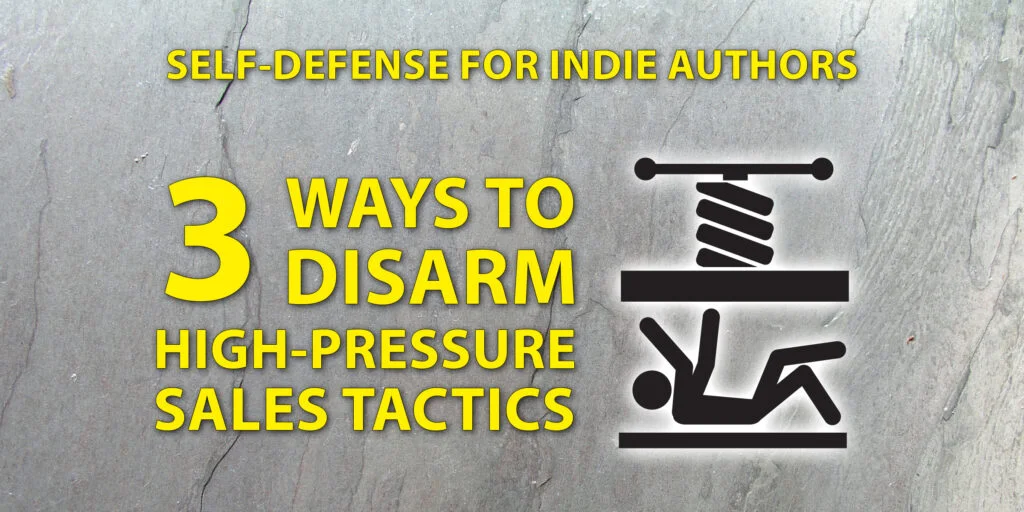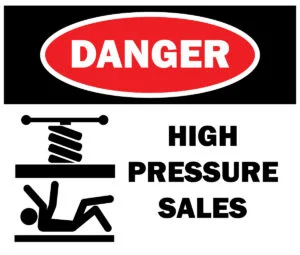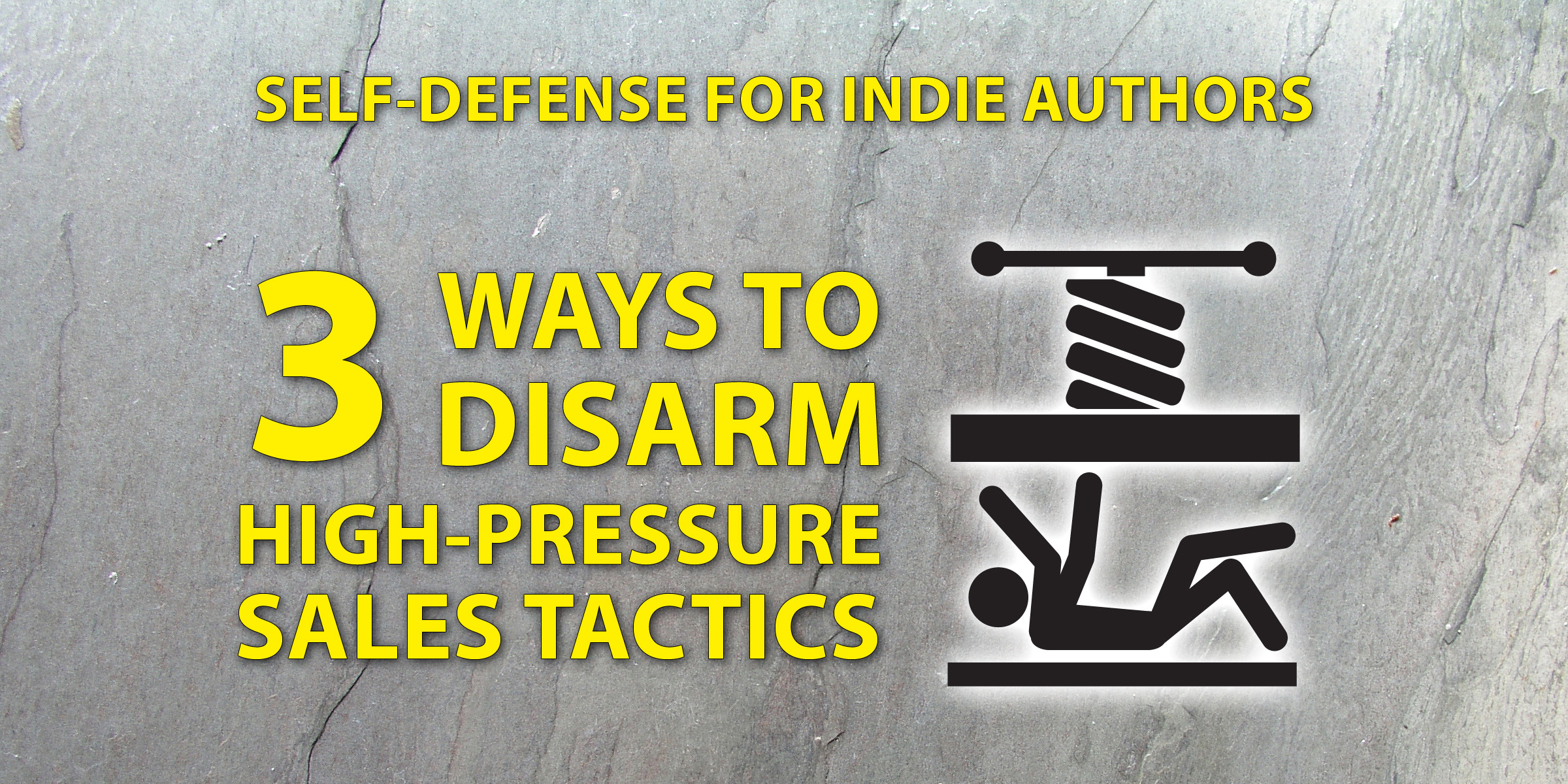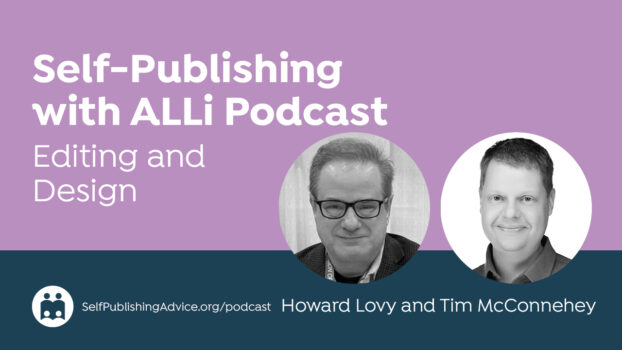 The growth of the self-publishing industry has made it a prime target for parasites and predators. To help protect you from con artists and predatory service providers, we're introducing Self-Defense for Indie Authors. This ongoing series of lessons will teach you to recognize and counter the deceptive tactics used to separate indie authors from their money.
The growth of the self-publishing industry has made it a prime target for parasites and predators. To help protect you from con artists and predatory service providers, we're introducing Self-Defense for Indie Authors. This ongoing series of lessons will teach you to recognize and counter the deceptive tactics used to separate indie authors from their money.
The attack: High-pressure sales
 All selling involves some degree of pressure. When a salesperson has confidence in their product and knows that the consumer wants to buy it, the challenge becomes negotiating a good deal for both parties. Because seller and buyer are working toward the same goal, and gentle pressure is all that's needed to reach a mutually beneficial deal.
All selling involves some degree of pressure. When a salesperson has confidence in their product and knows that the consumer wants to buy it, the challenge becomes negotiating a good deal for both parties. Because seller and buyer are working toward the same goal, and gentle pressure is all that's needed to reach a mutually beneficial deal.
But when the salesperson isn't interested in negotiating a mutually beneficial arrangement, the goal becomes maneuvering a buyer into a deal they don't want. That's when the high-pressure sales tactics come out, and the negotiation turns adversarial.
Recognizing the tactic
How can you tell the difference between normal sales pressure and high-pressure sales?
Trust your gut. A good seller empowers you with information and options, letting you reach a confident decision on your own. A predatory seller works to undermine your confidence and push you into a deal you don't want.
High-pressure selling is a form of bullying. It overwhelms the buyer's resistance by exploiting fear, doubt, confusion, and intimidation.
When you're in a negotiation, are you feeling like you're backed into a corner? Are you feeling angry? Frustrated? Vulnerable? If you're experiencing those negative feelings, consider whether the salesperson is pushing those buttons to take advantage of your emotional state.
Be wary of any seller who wields that weapon against you. If you do come up against those tactics, be prepared to defend yourself.
Defense #1: Catch your breath
If you've watched a boxing match, you've probably seen a clinch: one boxer, overwhelmed and nearing exhaustion, throws their arms around the opponent. The referee steps in, tells the boxers to break it up, and they both take a step back before the match resumes.
The clinch is a way for the boxer to regain his balance while simultaneously halting the opponent's momentum. When you find yourself against the ropes and overwhelmed by a seller's persistence, break their momentum and catch your breath:
- ignore artificial deadlines that rush you into a hasty decision
- ask questions that shift the burden of information onto the seller
- temporarily break off negotiations until you've had time to evaluate the information
It is your right as a consumer to receive information and to take the time to process it. Insist on it.
Defense #2: Check your stance
Salespeople are trained to turn a “no” into a “maybe”, and a “maybe” into a “yes”. However, good negotiators recognize the difference between a soft no — one that can be nudged into a “maybe” — and a hard no on which the other party will not budge.
If the answer to a question is a hard no, and you're certain of it, plant your feet and let the seller know you will not be moved. A firm declaration to this effect, repeated as often as needed and without explanation, becomes an impenetrable defense to even the most persistent salesperson.
Consider this exchange:
SELLER: “Would you like the 6-month extended warranty, or our deluxe 24-month warranty?”
BUYER: “No extended warranty, thank you.” [A firm, unambiguous declaration.]
SELLER: “I recommend the 24-month warranty to all my customers. It's a great bargain.” [Testing the buyer's resolve.]
BUYER: “No extended warranty, thanks.” [Repeating the answer.]
SELLER: “The standard warranty doesn't cover much. You really want an extended warranty.”
BUYER: “No extended warranty, that's my final answer.”
SELLER: “Would you mind explaining why you don't want to protect your investment?” [Pressuring.]
BUYER: “No extended warranty. That's my final answer.”
SELLER: “Is that all you're going to say?”
BUYER: “On this subject, yes: no extended warranty. That's my final answer.”
This broken record approach may seem obnoxious, but if the seller respects your wishes, this will not go beyond the first repetition. No explanation is needed for your decision, and it should be quickly obvious that the salesperson will not change your mind on this specific issue.
Affirm your stance as many times as necessary, but if the seller doesn't take the hint — or more accurately, disrespects your wishes — it's time to consider a third option…
Defense #3: Walk away
Sometimes, the best way to win a fight is to walk away from it, and sales negotiations are no exception. The willingness to walk away gives you the upper hand in a negotiation, because it is the seller who must work to keep you invested in that transaction.
When you can walk away, you are in control of the deal. Keep that in mind as you enter into a negotiation, because it's tremendously empowering. If a seller does not respect you and is not working for your advantage, be prepared to walk away and find one who will.
OVER TO YOU
What techniques do you find helpful in dealing with high-pressure sales? Share your advice in the comments below!
RELATED POSTS
3 essential #IndieAuthor self-defense tips to block high-pressure sales tactics Share on X




[…] Learn how to defuse high-pressure sales tactics. […]
[…] Learn how to defuse high-pressure sales tactics. […]
Great advice, John. Like a lot of indie writers in what Porter Anderson calls the “corridor of ambition”, I’ve signed up for those free webinars and subsequently come under extreme pressure to buy expensive courses that may be great, but which perhaps I’m not ready for. One of the most common tactics I see is that the marketers rely on our fear of missing out, which stems from our faith in our own books combined with the frequently encountered situation where those books aren’t selling as well as we’d like.
My answer to this pressure is to think: have I got the fundamentals in place that will allow me to take advantage of what I learn about marketing? If the answer is no, I’m not ready for the course in question. And it WILL come back around again, so in the meantime there are a host of other things an indie can do: build a better website, get reviews, or just write another (better?) book so you’ve got more content to market when the time comes.
“Trust your gut … If you’re experiencing those negative feelings, consider whether the salesperson is pushing those buttons to take advantage of your emotional state. …”
Absolutely!
If your gut says NO, stick with NO.
And, as Chris suggested–if necessary, crawl away.
One can add a #4: Do your research/homework. Arm yourself with knowledge and prevent being taken advantage of. Consult respectable sites for info, such as ‘Preditors & Editors,’ writersdigest.com, writermag.com, ALLi etc. Better even, use services recommended by trusted writer/author colleagues.
Thanks, John!
Yes, a thousand times #3 – walk, run or crawl away!